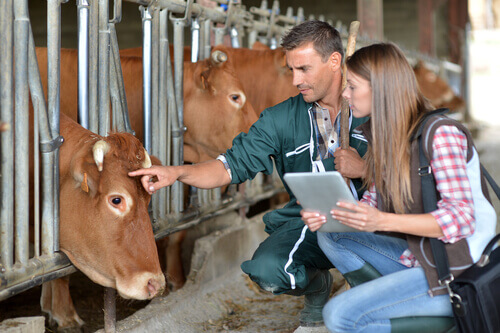Studying Veterinary Medicine: Everything You Need to Know


Written and verified by the veterinarian and zootechnician Sebastian Ramirez Ocampo
If you decide to study veterinary medicine, you’ll become a health professional dedicated to preventing, diagnosing, and treating the diseases that afflict both companion animals and production animals.
In addition, veterinary medicine is a science that plays a fundamental role in the welfare of human beings because, according to a publication in the Spanish Journal of Public Health, about 60% of the infectious diseases that affect people are of animal origin.
Are you thinking about practicing this beautiful profession but have some doubts? You’ve come to the right place. In the following article, we’ll explore what the career is about, the fields where it’s practiced, its advantages and disadvantages, as well as some tips that will help you during your student and professional life. Keep reading!
The history of veterinary medicine
As stated in the document History and Scope of Veterinary Medicine, the origins of veterinary medicine date back to more than 2,000 years B.C., with the first reports of people curing ruminant animals in ancient Mesopotamia. However, it’s presumed that it may have been much earlier, even from the early beginnings of civilization.
The term “veterinarian” originated in the Roman Empire. At that time, people who cared for and cured horses and cattle were called souvetaurinarii. This word, in turn, derives from the Latin veterina, meaning beast of burden.
Throughout history, veterinary medicine has made great advances and contributions to humanity, as explained in a publication in the journal Applied Animal Behaviour Science. Among the main ones, the following can be mentioned:
- The development of the first syringes
- The administration of the first non-oral medicines
- The development of the first vaccines for virus-induced cancers, such as feline leukemia
- The use of spinal anesthesia
- The documentation of arthropods that could transmit diseases, such as ticks
- Descriptions of most currently known retroviruses
“Medicine cures man, veterinary medicine cures mankind.”
Louis Pasteur, French chemist and microbiologist
You may be interested in: Veterinary Acupuncture: All You Need to Know
What does this professional career consist of?
In general, a veterinary degree lasts 5 years. During this period, general and specific topics related to the health of mammals, birds, fish, and even reptiles and amphibians are addressed.
Also, the life dynamics of some invertebrates that act as parasites of humans and animals themselves are studied. Among the main subjects studied in the course are the following:
- Anatomy: This is the science that studies the structure of living beings. It deals with topics such as the conformation of bones, innervation, the number of muscles, and the arrangement of organs in the body.
- Physiology: Explains the functioning of the body at a physical and molecular level. Processes such as the transmission of nerve impulses, the production of energy in the body, and the oxygenation of cells are studied in this subject.
- Internal medicine: Includes everything related to the prevention, diagnosis, and treatment of diseases affecting animals that don’t require surgery.
- Imaging: Different diagnostic methods such as X-rays, ultrasound, and tomography are explored.
- Pharmacology: Students learn about how drugs act in the body. In addition, the doses, frequencies, and contraindications of drugs are explored.
- Surgery: Surgical techniques and procedures used in companion and production animals are covered.
- Infectious diseases: Diseases caused by infectious agents such as bacteria, parasites, fungi, and viruses are studied. Likewise, zoonotic diseases, i.e., those transmitted between animals and humans, as studied
- Public health: All strategies and actions aimed at preventing the origin of infectious diseases are studied. It also ensures the welfare and quality of life of humans and animals.
What areas can I work in as a veterinarian?

As you can see, during the study of veterinary medicine, a variety of subjects are covered that are applied in different professional areas. However, it’s important to point out that some of them require a certain degree of specialization, which can be obtained through master’s and doctorate degrees. Among the areas of work, the following stand out:
- Small species veterinarian: Dedicated to companion animals, mainly dogs and cats.
- Exotic animal veterinarian: Unlike the previous case, this area deals with a wide variety of species, such as ferrets, rabbits, cockatoos, iguanas, snakes, and ornamental fish. It requires specialization.
- Large species veterinarian: In charge of the welfare and health of larger animals such as cows and horses.
- Researcher: Dedicated to the exploration and deepening of available knowledge to create something new. For example, vaccines, drugs, and the diagnosis of new diseases. Specialization is required.
- Government officials and organizations: They work in the area of public health and are in charge of preventing the appearance of diseases that afflict the population. They use strategies such as education, vaccination, and deworming of humans and animals.
- Educator: After acquiring a degree, a veterinarian can transmit their knowledge to universities or technical institutes.
- Ethologist: Responsible for identifying and correcting behavioral disorders in animals. Requires specialization.
- Imaging specialist: Specializes in the interpretation of diagnostic images obtained by X-ray, ultrasound, or MRI.
Discover: Natural and Holistic Veterinary Medicine
What should I keep in mind?
Studying veterinary medicine means taking on a great deal of commitment and responsibility. As veterinarian Adrian Pratt explains in an article in the magazine Veterinary Record, a person dedicated to this profession must exercise positive and inspiring leadership.
In addition to this, they must have the ability to work in a team and demonstrate empathy not only for animals, but also for people.
This is because most patients are in the care of a guardian or caregiver, so the interaction with humans is constant. Among other things, some positive and a few negative aspects can be identified in the practice of veterinary medicine:
Advantages
- It’s a broad field of work.
- Contributes to animal and human health.
- The acquisition of vast knowledge about various species.
- Intellectual challenging.
- Ideal for animal lovers.
- It’s a job full of rewarding moments.
- The possibility of entrepreneurship and creating one’s own businesses.
- Caring for the environment and public health.
- The prevention of epidemics and pandemics.
Disadvantages
- You’re at risk of being injured and catching diseases.
- It’s an undervalued profession, and the effort needed to practice it goes unrecognized.
- It requires a lot of time and dedication. You even have to work nights, weekends, and holidays.
Tips for studying and practicing veterinary medicine
Regardless of the field you want to dedicate yourself to, there are some tips that’ll help you during your student and professional life. We’ll share them with you below:
- Constant learning: Taking into account that all areas related to health are constantly evolving, it’s important that you always stay up to date on the latest news and discoveries. In order to be a more qualified professional and at the forefront, it’s important to attend congresses, take courses, or simply read new articles.
- Specialization: As there’s currently a wide range of veterinarians, being specialized will open up a wider labor field. Likewise, you’ll be able to acquire more specific knowledge and become an expert in a certain area.
- The development of soft skills: Working on soft skills such as interpersonal communication, emotional intelligence, stress management, and other social skills will make you a better professional. Keep in mind that you won’t only work with animals, but you’ll be in contact with all kinds of people.
- Mentoring of guardians: A good veterinarian must have the ability to counsel and educate those responsible for the animals.
- The practice of evidence-based medicine: According to an article in the journal The Veterinary Clinics of North America, it’s essential that practitioners base their treatments on scientific evidence. The goal is to avoid unsupported therapies and those practices that have been shown to be ineffective.

A profession looking toward the future
As set out in the 2016 article Veterinary medicine: public good, private good or both?, veterinary medicine is a field of study with many opportunities in the coming years.
According to its author, the globalization of the food system, the impact of environmental change on diseases and vectors, the problem of antimicrobial resistance, and the need for efficient public health systems will open doors for this type of professionals.
Now that you know everything about this career, you can make a decisive decision for your life, such as choosing a profession. If, after analyzing the pros and cons, you decide to study veterinary medicine, make sure you have a vocation and love for animals.
If you decide to study veterinary medicine, you’ll become a health professional dedicated to preventing, diagnosing, and treating the diseases that afflict both companion animals and production animals.
In addition, veterinary medicine is a science that plays a fundamental role in the welfare of human beings because, according to a publication in the Spanish Journal of Public Health, about 60% of the infectious diseases that affect people are of animal origin.
Are you thinking about practicing this beautiful profession but have some doubts? You’ve come to the right place. In the following article, we’ll explore what the career is about, the fields where it’s practiced, its advantages and disadvantages, as well as some tips that will help you during your student and professional life. Keep reading!
The history of veterinary medicine
As stated in the document History and Scope of Veterinary Medicine, the origins of veterinary medicine date back to more than 2,000 years B.C., with the first reports of people curing ruminant animals in ancient Mesopotamia. However, it’s presumed that it may have been much earlier, even from the early beginnings of civilization.
The term “veterinarian” originated in the Roman Empire. At that time, people who cared for and cured horses and cattle were called souvetaurinarii. This word, in turn, derives from the Latin veterina, meaning beast of burden.
Throughout history, veterinary medicine has made great advances and contributions to humanity, as explained in a publication in the journal Applied Animal Behaviour Science. Among the main ones, the following can be mentioned:
- The development of the first syringes
- The administration of the first non-oral medicines
- The development of the first vaccines for virus-induced cancers, such as feline leukemia
- The use of spinal anesthesia
- The documentation of arthropods that could transmit diseases, such as ticks
- Descriptions of most currently known retroviruses
“Medicine cures man, veterinary medicine cures mankind.”
Louis Pasteur, French chemist and microbiologist
You may be interested in: Veterinary Acupuncture: All You Need to Know
What does this professional career consist of?
In general, a veterinary degree lasts 5 years. During this period, general and specific topics related to the health of mammals, birds, fish, and even reptiles and amphibians are addressed.
Also, the life dynamics of some invertebrates that act as parasites of humans and animals themselves are studied. Among the main subjects studied in the course are the following:
- Anatomy: This is the science that studies the structure of living beings. It deals with topics such as the conformation of bones, innervation, the number of muscles, and the arrangement of organs in the body.
- Physiology: Explains the functioning of the body at a physical and molecular level. Processes such as the transmission of nerve impulses, the production of energy in the body, and the oxygenation of cells are studied in this subject.
- Internal medicine: Includes everything related to the prevention, diagnosis, and treatment of diseases affecting animals that don’t require surgery.
- Imaging: Different diagnostic methods such as X-rays, ultrasound, and tomography are explored.
- Pharmacology: Students learn about how drugs act in the body. In addition, the doses, frequencies, and contraindications of drugs are explored.
- Surgery: Surgical techniques and procedures used in companion and production animals are covered.
- Infectious diseases: Diseases caused by infectious agents such as bacteria, parasites, fungi, and viruses are studied. Likewise, zoonotic diseases, i.e., those transmitted between animals and humans, as studied
- Public health: All strategies and actions aimed at preventing the origin of infectious diseases are studied. It also ensures the welfare and quality of life of humans and animals.
What areas can I work in as a veterinarian?

As you can see, during the study of veterinary medicine, a variety of subjects are covered that are applied in different professional areas. However, it’s important to point out that some of them require a certain degree of specialization, which can be obtained through master’s and doctorate degrees. Among the areas of work, the following stand out:
- Small species veterinarian: Dedicated to companion animals, mainly dogs and cats.
- Exotic animal veterinarian: Unlike the previous case, this area deals with a wide variety of species, such as ferrets, rabbits, cockatoos, iguanas, snakes, and ornamental fish. It requires specialization.
- Large species veterinarian: In charge of the welfare and health of larger animals such as cows and horses.
- Researcher: Dedicated to the exploration and deepening of available knowledge to create something new. For example, vaccines, drugs, and the diagnosis of new diseases. Specialization is required.
- Government officials and organizations: They work in the area of public health and are in charge of preventing the appearance of diseases that afflict the population. They use strategies such as education, vaccination, and deworming of humans and animals.
- Educator: After acquiring a degree, a veterinarian can transmit their knowledge to universities or technical institutes.
- Ethologist: Responsible for identifying and correcting behavioral disorders in animals. Requires specialization.
- Imaging specialist: Specializes in the interpretation of diagnostic images obtained by X-ray, ultrasound, or MRI.
Discover: Natural and Holistic Veterinary Medicine
What should I keep in mind?
Studying veterinary medicine means taking on a great deal of commitment and responsibility. As veterinarian Adrian Pratt explains in an article in the magazine Veterinary Record, a person dedicated to this profession must exercise positive and inspiring leadership.
In addition to this, they must have the ability to work in a team and demonstrate empathy not only for animals, but also for people.
This is because most patients are in the care of a guardian or caregiver, so the interaction with humans is constant. Among other things, some positive and a few negative aspects can be identified in the practice of veterinary medicine:
Advantages
- It’s a broad field of work.
- Contributes to animal and human health.
- The acquisition of vast knowledge about various species.
- Intellectual challenging.
- Ideal for animal lovers.
- It’s a job full of rewarding moments.
- The possibility of entrepreneurship and creating one’s own businesses.
- Caring for the environment and public health.
- The prevention of epidemics and pandemics.
Disadvantages
- You’re at risk of being injured and catching diseases.
- It’s an undervalued profession, and the effort needed to practice it goes unrecognized.
- It requires a lot of time and dedication. You even have to work nights, weekends, and holidays.
Tips for studying and practicing veterinary medicine
Regardless of the field you want to dedicate yourself to, there are some tips that’ll help you during your student and professional life. We’ll share them with you below:
- Constant learning: Taking into account that all areas related to health are constantly evolving, it’s important that you always stay up to date on the latest news and discoveries. In order to be a more qualified professional and at the forefront, it’s important to attend congresses, take courses, or simply read new articles.
- Specialization: As there’s currently a wide range of veterinarians, being specialized will open up a wider labor field. Likewise, you’ll be able to acquire more specific knowledge and become an expert in a certain area.
- The development of soft skills: Working on soft skills such as interpersonal communication, emotional intelligence, stress management, and other social skills will make you a better professional. Keep in mind that you won’t only work with animals, but you’ll be in contact with all kinds of people.
- Mentoring of guardians: A good veterinarian must have the ability to counsel and educate those responsible for the animals.
- The practice of evidence-based medicine: According to an article in the journal The Veterinary Clinics of North America, it’s essential that practitioners base their treatments on scientific evidence. The goal is to avoid unsupported therapies and those practices that have been shown to be ineffective.

A profession looking toward the future
As set out in the 2016 article Veterinary medicine: public good, private good or both?, veterinary medicine is a field of study with many opportunities in the coming years.
According to its author, the globalization of the food system, the impact of environmental change on diseases and vectors, the problem of antimicrobial resistance, and the need for efficient public health systems will open doors for this type of professionals.
Now that you know everything about this career, you can make a decisive decision for your life, such as choosing a profession. If, after analyzing the pros and cons, you decide to study veterinary medicine, make sure you have a vocation and love for animals.
All cited sources were thoroughly reviewed by our team to ensure their quality, reliability, currency, and validity. The bibliography of this article was considered reliable and of academic or scientific accuracy.
- Briones Dieste, V., Bezos Garrido, J., & Álvarez Sánchez, J. (2018). Concepto y contenidos actuales de Salud Pública y Política Sanitaria veterinarias. Revista Española de Salud Pública, 92, e201810077. https://scielo.isciii.es/scielo.php?script=sci_arttext&pid=S1135-57272018000100310
- Hueston W. (2016). Veterinary medicine: public good, private good or both?. The Veterinary Record, 178(4), 98–99. https://bvajournals.onlinelibrary.wiley.com/doi/abs/10.1136/vr.i260
- Pratt, A. (2017). What type of leadership does the veterinary profession need?. The Veterinary Record, 181(18), 483. https://bvajournals.onlinelibrary.wiley.com/doi/abs/10.1136/vr.j5066
- Quimby, F. (1998). Contributions to veterinary medicine from animal research. Applied Animal Behaviour Science, 59, (1-3), 183-192. https://www.sciencedirect.com/science/article/pii/S0168159198001324#:~:text=In%20addition%2C%20veterinarians%20conducting%20investigations,could%20be%20transmitted%20by%20arthropods.
- Samad, A., & Ahmed, M.U. (2009). History and Scope of Veterinary Medicine. Bangladesh Journal of Veterinary Medicine, 1(1), 01-08. https://www.researchgate.net/publication/244941976_History_and_Scope_of_Veterinary_Medicine
- Schmidt P. L. (2007). Evidence-based veterinary medicine: evolution, revolution, or repackaging of veterinary practice?. The Veterinary Clinics of North America. Small Animal Practice, 37(3), 409–417. https://www.sciencedirect.com/science/article/abs/pii/S0195561607000022?via%3Dihub
This text is provided for informational purposes only and does not replace consultation with a professional. If in doubt, consult your specialist.








